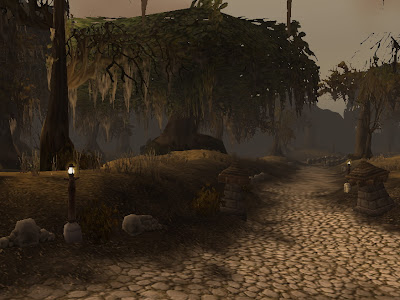
Soft light glimmered through the veil of waves, the water's force slowing and pushing me up towards it. I emerged from the gray waters of Dreadmurk Shore onto a rocky and desolate beach and promptly collapsed from exhaustion.
A swamp bird’s throaty cries awoke me a while later, near the end of the day as the darkening sky filled with black clouds. The muggy air lay like a blanket on the lonely shore. I could not tell exactly where I was, though I hoped I was near Theramore Isle. Not far from my position was a small island covered in lichen and sporting a few palm trees. Pale murlocs ambled curiously near the waters, though they were mercifully absent on my side.
Reasoning that a southern path would eventually lead to Theramore Isle, I set off on weak legs. I think I had blacked out in the tunnel, perhaps from the sheer velocity. I felt as if I’d been pummeled.
I reflected on what little I knew about Theramore. I did not learn of its existence until after I became Forsaken. Theramore is the only non-Kaldorei, Alliance city of any size on Kalimdor. Humans, dwarves, and high elves work together to create a new home on the doorstep of a strange and often hostile continent.
Talk of Theramore in the Alliance cities of the east tends to be critical. The survivors of the Scourge feel abandoned by the Theramore settlers, and regard them as cowards or shirkers. Even more controversial is the Battle of Theramore, which occurred a year after the Battle of Mt. Hyjal, and is largely responsible for the modern political situation.
Lord Admiral Proudmoore of Kul Tiras had led a large fleet to Kalimdor to search for survivors. He attacked the orcs as soon as he found them. When his daughter Jaina, the leader of Theramore, told him to cease his invasion, he took command of the island nation and made plans for a full-scale war against the Horde. A quick, Horde-led strike killed Proudmoore and returned control of Theramore to Jaina.
Jaina’s actions prevented open warfare between the Horde and Alliance, but many in the East condemned her as a traitor for not helping her father. Though Theramore is still a part of the Alliance, it is distrusted by other member nations and has little influence.
I spent the night on the beach. The morning brought rain, amplifying the humid and oppressive climate. The clouds parted shortly after noon and the glaring sun created a sticky heat on the empty shore. Though similar in many respects, Dustwallow Marsh feels much more threatening than the Swamp of Sorrows, though I could not tell why I thought that. Perhaps it is because Dustwallow is still a very primal land. Though mostly wilderness, trolls, humans, orcs, and even a few draenei have explored the Swamp of Sorrows. As far as I knew, no one lived in Dustwallow prior to the arrival of humans, and even the newcomers mostly stay on the coast.
The sun was setting when I at last saw the parapets of Theramore Isle. Theramore looks more like a fortress than a city, and in many ways it is. The inhabitants of Theramore are a tough lot: survivors of the Scourge, demons, political instability, and the rigors of living in a strange land.
I reached the road leading to the gates of the city, which struck me as a bit grandiose in appearance. The road in front of the gate was nearly empty save for soldiers on patrol. I found out that Theramore receives very little traffic from the mainland. There is no shortage of sea-borne visitors, a fact I saw upon actually entering the city.
Most inhabitants are humans, though I saw a substantial number of high elves. Some say that Theramore Isle contains the largest population of high elves in the world, though other sources claim more of the surviving Quel’dorei live in Stormwind City.
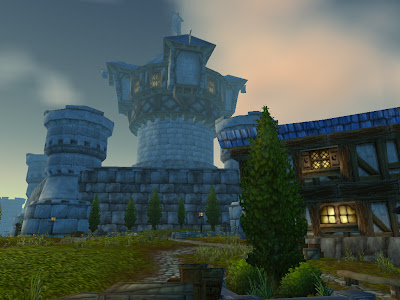
I was impressed by the preparedness of Theramore’s citizens. Guard stations stand all through the city stocked with arrows, quarrels, powder, and bullets. The vast majority of citizens own weapons of some sort, and the supply depots are set up to ensure that the city will have always have spare ordnance. They also have melee weapons in stock, which are actually meant for visitors.
“When an army lays siege to this place, we do expect every able-bodied visitor to take up arms in defense of Theramore,” explained Ellivia Mensius, a guard at one of the depots. She originally hailed from Lordaeron, in what is now known as the Western Plaguelands.
“Are attacks common?” I asked.
“It’s been quiet this year, but we were twice attacked by murlocs in the first few years—the second time they nearly got into the city—and more recently by the Southsea Raiders. They got one of their vessels up to the walls and let loose with a volley. We only just repaired the damage.”
“Have you had any trouble with the Horde?”
“The Horde has never caused us trouble. The trouble was started by Admiral Proudmoore. Though I suppose you think that everyone in Theramore is an orc lover.”
“Not at all, I believe Jaina made the right decision in opposing her father.”
“Good. Strangers here like to smear us for siding with the orcs. In fact, so do some citizens. When the orcs got in and killed the admiral, it scared off a lot of people. They did not want to see orcs running in the streets of Theramore, so they went out into the swamp. They still live there in little villages along the road. Mostly they keep to themselves.”
“Isn’t that dangerous for them?”
“Not as much as you might think. They only have to worry about murlocs every now and then. A lot of our soldiers left too. The deserters are still out there somewhere in the marsh.”
“Are they a danger?”
“To lone Horde travelers maybe. We’d go after them, but that’d probably cause a riot. A lot of people have a bit of sympathy for the cowards, and Jaina can’t afford to anger anyone else. The poor woman’s got a lot to worry about.”
Most people in Theramore actually are loyal to Jaina, but even her most fervent admirers have mixed feelings about her actions in the Battle of Theramore. Fundamentally it is the issue of her taking up arms against her own race and family. While the orcs had stood alongside Theramore at the Battle of Mt. Hyjal, that seems like a long time ago for many people. The Scourge and the Burning Legion appear as increasingly distant threats.
“The orcs would have destroyed us all during the Second War were it not for Lord Admiral Proudmoore,” said a fisherman. His sentiment is a common one. Many think that Jaina should have tried harder to negotiate with her father.
I got a room at the Theramore Inn, which is a clean and serviceable establishment catering to travelers. Like all port towns, Theramore is full of sailors. However, it is much quieter and safer than rowdy Menethil Harbor. The fact that nearly every inhabitant has some form of combat training (and more often than not, experience) keeps most sailors on their best behavior. I spoke with a grizzled Tirasi sailor named Giotto Colobri.
“I’m surprised as many ships come here as they do. I guess it’s the only Alliance port-of-call on the entire eastern coast, but it’s hard to get here,” he complained.
“Because of the distance?”
“Because it’s a terrible harbor! The waters around here are dangerous; a ship could easily crash on the rocks. There’s lots of wizards here, so they’ll probably find you if you crash, but it’s still an awful bother. Keeps a lot of traders away.”
“Are successful runs usually profitable?”
“I guess they must be. I’m just a sailor, I don’t know much about that stuff. I do get good pay on a Theramore run though. If I didn’t, I’d stay far away from this place. It’s only a matter of time before the orcs take Theramore.”
“Oh?”
“Indeed. It is Jaina, you see, she is Thrall’s lover. They have some horrible bastard child that’s half-orc. They mean to make the little monster the King of Theramore, or so the bosun says, and he’s a sharp fellow so he’d know. The people that live here get right furious at you if you tell this to them. They’re probably in on it.”
Giotto took a deep draught from his tankard.
“Ah, and that’s another thing. This place is as cheery as a funeral. What I wouldn’t give to be in Menethil. Now that’s a town!”
Stories in the Eastern Kingdoms about Thrall and Jaina tend to be bawdy, conspiratorial, or both. It is the sort of idiocy that is too easily embraced by the ignorant. As Giotto had warned me, it is a very sensitive issue to the citizens of Theramore. Whatever their doubts about Jaina, they are ready to defend her if an uncouth outlander mocks her. I saw this firsthand when a drunken Tirasi sailor (part of Giotto’s group) sneered at the barkeep, calling Jaina an orc-loving harlot. Two guards that were relaxing at the tavern got up from their table and arrested the sailor for disturbing the peace. Too inebriated to resist effectively, he was dragged out while shouting curses. Individuals like that are typically imprisoned for a night and released the next morning. While the punishments are mild, they do set an ominous precedent.
I awoke to a clear sky and a crisp wind blowing in from the ocean. Such light, breezy weather serves to cheer the normally grim populace. Even so, good weather is no excuse to shun work. Soldiers constantly drill in the training fields of the massive Foothold Citadel, participating in mock combat or target practice.
“Sir! Sir!” called a voice. I turned to see a human youth walk towards me. In his hand he held a bag on which was stitched the symbol of a white tower with a black letter N. The same icon was on his tunic.
“I’m from the Friends of Northwatch Hold, I’m collecting funds for the soldiers there. Can you spare a few silver pieces?”
“Could you tell me about Northwatch Hold? I’ve only just arrived,” I explained.
“Certainly. Northwatch Hold is a fortress on the coast of the Barrens, just south of Ratchet. Captain Fairmont is in charge there, and she helped Lord Admiral Proudmoore, Lady Jaina’s father, in his efforts against the orcs.”
“What happened after the Battle of Theramore?”
“Captain Fairmont’s out in the Barrens, so she knows what the orcs are like. She knows that they’re a threat, and that they cannot be trusted. As a result, Northwatch Hold is not technically under the jurisdiction of Lady Jaina. I’ll tell you though, that most people here feel much safer knowing that Northwatch is out there defending them. My brother is stationed in Northwatch, and I might join myself one day!”
“Could you explain the exact relationship between Theramore and Northwatch? I’m still a bit confused.”
“I think it’s safe to say that Northwatch is like an ally of Theramore. They’ll defend us, even though we do not always appreciate their efforts. Unfortunately, Lady Jaina is not interested in helping them, but sympathetic private parties are allowed to fund them. In a very real way, people like you keep up the defense in Kalimdor.”
“Northwatch is effectively at war with the Horde then?”
“Any Horde they find is fair game, and they make frequent patrols of the area. My brother writes to me, and they’re very dedicated to their duty. It’s a hard life though; sometimes it is difficult for them to get what they need. That’s why this is so important.” He expectantly held out the bag, a hopeful smile on his face.
I could not in good conscience lend a helping hand to Northwatch Hold. I told him that I had very little money, and could not afford any donations.
Much like Jaina, Northwatch is the object of conflicting emotions. It would not be inaccurate to say that Northwatch has gone rogue. But the soldiers there are the friends and family of the people in Theramore. Jaina cannot take any real action against Northwatch without angering the citizenry. Survival is the main concern of the humans in Kalimdor. Political factionalism is secondary. Yet I was unclear on how Northwatch’s attitude significantly differed from any other Alliance settlement. After all, if I revealed myself as a Forsaken in Theramore, they would cut me down on the spot.
As the reddish sky of Dustwallow slowly darkened into evening, I went to Proudmoore Tower, the administrative seat of Theramore Isle. From her chamber on the top floor Jaina watches over the fledgling nation. The relatively democratic nature of Theramore encourages a degree of popular activity in government. A group of representatives called the Council of Seven reviews Jaina’s decisions and puts them into action, though they can modify or even veto her choices. A veto can only pass with full agreement among all seven council members, and no attempted veto has yet been successful. However, they can easily make changes to Jaina's policies. Nonetheless, the balance of power is tipped slightly in Jaina’s favor.
I think this method of government is a vast improvement over the old kingdoms of the east. Because of Theramore’s haphazard birth, nobles cannot make any claim to the land. As the nobility was on the decline prior to the Scourge, the people are not inclined to reinstitute it.
The upper levels of the tower are understandably off-limits to those not there on official business. The foyer is open to all. There the populace brings their requests and complaints to officials, who in turn send it to the council. As most of the people in Theramore are literate, they usually write down their concerns on paper and hand it to an official, though a scribe is on hand for those unable to write.
In the tower, I spoke to a mage named Vander Livian. Though I did not even remotely recognize him, I remembered the name from my time in Dalaran. Given that he was the right age, he must have been the same person. I believe Vander was a friend of mine during the first few years, though I lost touch with him as we grew older.
“Northwatch has the potential to be a catastrophe for Theramore Isle. After the Battle of Theramore, it was decided that the Barrens would be Horde territory. We cannot speak for the entire Alliance; they’d dispute the agreement because of Bael Modan, which is a dwarven dig site in the southern Barrens. Yet, as far as Theramore is concerned, the Barrens are strictly Horde territory, excluding Ratchet. But that was before we found out that Captain Fairmont went off on her own. Northwatch Hold should have been disassembled after the battle,” explained Vander.
“I take it that demanding the abandonment of Northwatch would be too divisive a move?”
“It would. Two of the council members have children in Northwatch, and the general consensus is that they are not doing anyone any harm. They haven’t, yet. I’ve met Captain Fairmont though, and she’s a very aggressive sort. I do not trust her.”
“Have the soldiers in Northwatch made any attacks on Horde settlements?”
“No. The only reason Northwatch still exists is because the Horde doesn’t yet consider them a major threat.”
“If Northwatch were attacked, would Theramore intervene?”
“Definitely not. It’s been established that Northwatch stands alone on this, at least in regards to the Alliance. Now, I’ve heard that the Southsea Pirates are starting to expand onto the Merchant Coast, in the Barrens. That’s not far from Northwatch, so I would not be surprised if there’s some relationship between the two groups. The Southsea Pirates are the avowed enemies of Theramore, so Northwatch should have done something about them. So far, they have not.”
“How big a threat are the Southsea Pirates?”
“Hard to say. Not as much as they were; we sank a good portion of their fleet when they attacked Theramore last year. It will be a while before they get daring enough to attack a city. The pirates and Northwatch are both desperate, one reason they might decide to work together. That’s ultimately just speculation though. The real danger is the dragons. A whole roost of black dragons lives along the southern marsh.”
“Have they attacked?”
“Not yet, and I say a prayer of thanks for that every day. Jaina is a mighty archmage, but I fear even she would not survive if the dragons made an attack in earnest. There’s supposed to be a great big one called Onyxia, the Queen of the Black Dragonflight, or so they say. There used to be a large ogre... well, not really a town. Settlement, let’s say. Anyway it was called Stonemaul, and the dragons razed it overnight. The survivors made a village far to the north called Brackenwall. They’re still there.”
“Are there any plans to repel the dragons if they attack?”
“We have a surplus of plans. I can only hope that one of them will work. Dragons are strange creatures. It’s entirely possible that they will completely ignore us. We have to take precautions though. Oh, did you say your name is Talus?”
“It is.”
“Ah. You look eerily similar to an old friend of mine when I was a student in Dalaran. But his name was Destron Allicant. You said you were a mage yourself, I don’t suppose you’d know him?”
“I knew him, though not well.”
“Any idea what happened to him?”
“No, I’m afraid not,” I lied.
“Such is life I suppose,” he said.
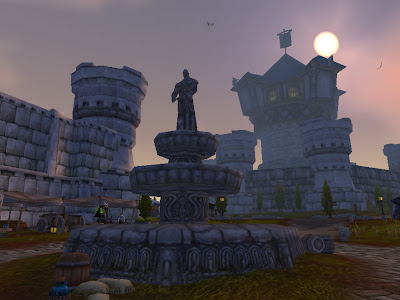
I spent two more days in Theramore Isle, finding it a favorable place. The humans who saw their homes devastated by the Scourge have done a remarkable job building a new haven across the sea. The people of Theramore tend to be practical and tough, both necessary qualities for surviving in a strange land. While most people are wary of the Horde, the obvious benefits of a truce outweigh any prejudice.
The real problem in Theramore will not arise until the nation is more firmly established (assuming it survives). Though they disagree on some issues, the people of Theramore know that they must work together. Once the immediate danger of survival is over, factionalism might well grow more extreme. The mood toward the Horde may shift from distrust to outright hostility. Issues like Northwatch, or the unresolved sentiments over Lord Admiral Proudmoore’s death, are potential disasters.
Another issue is one of race. Humans and high elves hold a majority position on the island. Few dwarves were among the initial group of refugees, but in recent years many made their way to Theramore, bringing their vaunted craftsmanship and work ethic with them. Quite probably, some dwarves in Theramore are of the Unwanted class trying to make new lives.
While humans, dwarves, and elves are all capable of working together, some are angered by an imbalance in the Council of Seven. Humans occupy five of the council seats, while the elves hold two. The dwarves have none. The most obvious reason for this (at least from a human perspective) is because there were fewer elves and dwarves than humans. However the elves and dwarves object that human fecundity gives the young race an unfair advantage when positions on the Council are awarded by basis of population. While no serious divisions have appeared, the potential for them exists.
The dwarves are quite driven to get representation on the Council, while the high elves are more lackadaisical. One reason is that they already have two representatives. There are also cultural reasons for their attitude. The elves care little for involvement in human activity. Some elves almost prefer their limited representation in the Council. Another problem is the trauma suffered by the elven people. Already inward looking, many elves became even more introverted following the destruction of their beloved homeland.
I visited the elven community on my last day. The elf neighborhood is a disappointing sight. The elves live in a cluster of ragged houses near the gate. They attempted to replicate the delicate splendor of their old homes in Quel’thalas but obviously gave up on the effort. Buildings are only half-painted, with careless placement of ornamentation. I learned that some humans wanted to remove the elves from the Council entirely, and give the position to the dwarves. The reason is that, though the elven population in Theramore is higher than the dwarven, the dwarves are vastly more productive. While those elves who overcame their torpor are invaluable assets to Theramore, many are lost in their own misery.
Besides the Council, Theramore is also the headquarters of the Alliance Assembly, a group of representatives from the member nations of the Alliance. The Assembly’s purpose is to direct Allied policy and strategy, but its power is mostly nominal. The member nations frequently go their own way, heedless of the Assembly’s decisions. The Alliance nations of the Eastern Kingdoms resent the fact that the Assembly meets in Theramore. The citizens of Theramore, on the other hand, are mostly indifferent to the Assembly, as it has little impact on their lives.
*********
Animal song bursts from the darkness as night falls over the swamp. The dank, humid air shakes with the calls of swamp birds and the endless chirping of cicadas. Swarms of glowing fireflies drone over stagnant ponds thick with reeds and lilies.
I was two days into Dustwallow Marsh, traveling with a dwarven prospector named Normac Stonefist. It was Normac’s first time in Kalimdor, and he was having difficulty adjusting to Dustwallow’s inhospitable climate.
“I figured the Wetlands would be preparation enough. Oh, was I wrong,” he lamented.
We were both covered in grime. Dustwallow Marsh is aptly named. Fine particles of grit and ash often drift down from the sky, coating the swamp canopy. The dust comes from the activities of the dragons to the south. The frequent rainstorms wash most (though never all) of the grit into the soil and water. Though ash increases the fertility of soil, the ground in Dustwallow is too marshy for large-scale agriculture. The climate is always torrid. I was untroubled by this, but Normac was nearly incapacitated. I began to have serious doubts that he would be able to do his work in the mountains to the west.
Unlike the Wetlands or the Swamp of Sorrows, Dustwallow is not the delta of a great river. Only a few small streams trickle through the morass. Most of the water in the swamp is from a preponderance of artesian springs, or the simple result of rain filling up the depressions in the ground. Water from the latter is obviously not potable. Hordes of biting insects also serve to make life miserable for visitor and inhabitant alike.
What little infrastructure that exists in the swamp is in poor shape. The bridges that lead across channels are rickety structures, and we even saw one that had collapsed some time earlier. The area immediately outside of Theramore is settled but beyond that the swamp is largely untamed.
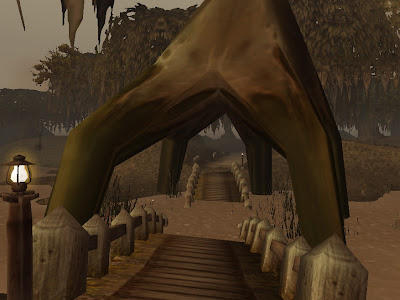
“I knew it was tough going out here, but I never thought it would be this bad,” said Normac. It was the third day of travel, and we were trying to follow the road, which faded in and out of the muck.
“Perhaps you should stay in Theramore for a while, until you get acclimated to this place,” I suggested.
“Ah, don’t mind my complaining. My father would rise from his grave in wrath if I gave up this easy,” he laughed.
“I really do think you should consider it. You wouldn’t be giving up, merely postponing your task.”
“Trust me, if I don’t get to those mountains, someone else will.”
“I rather doubt that.”
“I’m not taking any chances about that either way. You know, my sister found a great vein of gold out in the Badlands. She went right at it, though she was in the midst of Dark Irons and ogres. She came back a rich woman. I’d be doing my family a disservice if I went back now.”
His voice sounded less confident than his words. Normac’s health declined further on the fourth day, though he stubbornly went forward. It was just before sunset when we arrived at a tiny hamlet in the swamp consisting of nine ramshackle wooden houses. They were unpainted, streaks of dirt covering the walls and roofs. A handful of scrawny looking pigs rooted around in a pen, while tired looking humans tended vegetable gardens. One of them, a rangy fellow with a missing left arm, greeted us.
“Hello there! Are you from the town?” he asked.
“We came from there, though neither of us are citizens of Theramore. Do you have an inn?”
“I’m afraid not, but I can put you up for the night if you need. My name’s Martul Corestiam.”
I was slightly taken aback that his surname was the same as the surname of my pseudonym.
“What a coincidence, my name is Talus Corestiam.”
“Well I’ve never met you before, but perhaps we’re related somehow. Make yourselves welcome.”
Normac nodded, his face flushed. Martul frowned.
“Your friend doesn’t look too good. Here, come on in out of the sun and I’ll get Hyla, the priestess.”
Martul led us into his home, the interior of which was better cared for than the exterior. Normac gratefully took a seat and gulped down the water Martul provided. Martul left, and came back with an elderly woman in tattered ecclesiastical robes.
I talked with Martul, and learned about his situation. He and the other villagers were humans who left Theramore after Admiral Proudmoore’s death. He mentioned a few other villages scattered around the swamp, though conditions were difficult at best. Many settlers had returned to Theramore despite their reservations.
“It is hard out here, but we’ve done better than most. I just don’t feel safe in Theramore. Maybe the Lord Admiral was misguided, but to turn on him the way we did? That was not right.”
“Are you safer out here, though?”
Martul laughed.
“We certainly are not. But here we have control over our own destinies. I know my neighbors won’t betray me, or side with orcs. Some people say the orcs have changed, and maybe they have. But I’m not taking any chances.”
“May I ask how you lost your arm?”
“I was one of the king’s rangers back in Lordaeron. There was a group of ogres in southern Silverpine. This was long after the Second War, so they were just holdouts. We found them, and killed them, but they took my arm. Luckily, a ranger gets a royal pension, so I was basically all right until the Scourge came along.”
Hyla ceased her ministrations to Normac, who was in a daze.
“He’s got ochre fever. He should recover with medicine and rest,” she said.
“You aren’t able to cure it through spells?” I asked.
“No. It’s what the gnomes call a, what is it... a viral disease.”
Ancient priests and healers assumed that sickness was the result of magic and dark spirits. Diseases that a cure or abolish disease spell could not eliminate were judged to simply be too strong. The gnomes were the first to discover that tiny animals, invisible to the naked eye, cause disease. One type is called bacteria, which priests can handle with relative ease. The other, more primitive kind, are called viruses. They are immune to priestly magic, so cures must come from science and nature.
Hyla summoned a youth to help Normac into a bed. She assured me that he would be all right so long as he stayed. It did not look as if he would be capable of going anywhere.
I stayed the night in the village and left before noon the next day. I talked some more with Martul, who explained the relationship between the villagers and Theramore. The small swamp towns are not actually under the jurisdiction of Theramore Isle. However, contact is cordial and relatively frequent. Merchants sometimes come from Theramore, supplying goods that are of use to the struggling villages.
“The soldiers will defend us too, if we ask for help. They can’t promise that they’ll always be there. Their first duty is to Theramore. Still, they helped us out with Tabetha a few years ago.”
“Tabetha?”
“She lived up in what we call Witch Hill, just to the west. I suppose she must have come in Jaina’s fleet, though no one claimed to know her. We thought Tabetha was a mage. Mages can be a little intimidating, but we all figured she was fine. Then we started hearing stories about her summoning demons.”
“Did you see her do this?”
“I did not. But some very reliable people here did. So we went down to North Point Tower, a fort by the road that you’ll probably reach before nightfall. They let us have a few soldiers and we went up to her house on Witch Hill.”
“What happened?”
“We confronted her, told her that she was not welcome near our town. Tabetha took the hint, and went off somewhere into the swamp. My wife said we ought to have killed her, but as she’d never done anything to actually hurt us, I couldn’t justify such a thing. Demons are dangerous, so if she wants to deal with them, she’s going to do it in a place where she can’t hurt anyone else.”
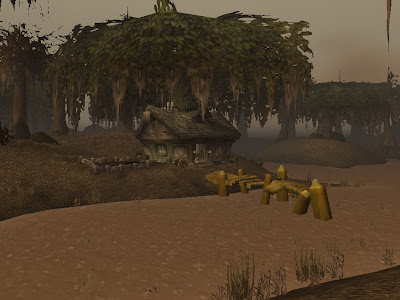
Martul took me to the main road, and wished me luck on my journey. I thanked him for his hospitality, and went on my way.
*********
The dismal Horde outpost of Brackenwall Village is situated on soggy strip of land surrounded by a muddy lake. To get there from the main road I first had to go through a barren island that the ogres use as a graveyard. They hope that the spirits of departed ogres will guard the route against invaders.
In the tumultuous days before the Battle of Theramore, the Horde champion Rexxar went to the Stonemaul ogre clan for aid. He accomplished this by besting their chieftain in combat. Since then, the Stonemaul have been nominal members of the Horde. There is a small contingent of unhappy orcs living in Brackenwall Village. Orcs and ogres have a history of enmity stretching back thousands of years. Their brief alliance during the Second War did not create a lasting impression, and the orcs of the modern world are disgusted by ogre barbarity.
“All they do is fight. Honor is more alien to them than it is to humans,” spat Grag, a young orcish warrior. Orcs are not necessarily friendly towards the Forsaken, but they find more common ground with undead humans than with the ogres.
“How do they work as a society if all they do is fight?”
Grag shrugged.
“I’m a warrior, I do not watch over how ogres live their miserable lives. All I know is that they fight, at least as long as they know they can win. You’d think they’d have fought back against the black dragons, but they ran away. They’re scared of anything bigger than them.”
Grag warned me about entering the interior of the village, saying that he could not guarantee my safety. I told him I would leave at the first sign of trouble. The biggest problem is that few of the ogres speak any language besides their own.
Brackenwall Village is made up of a cluster of rude hovels and tents surrounding a large bonfire that is kept alight at all times. Ogres fuel the fire with refuse, piles of which lie festering all over the village. A living carpet of flies feasts off of the rubbish heaps.
I heard a terrible roar and then a crashing sound as one ogre punched another. Soon the two of them were brawling, shrugging off blows that would have incapacitated a tauren. A few other ogres ambled over to the hubbub, making encouraging grunts. Finally one of the combatants fell, shaking the ground when he landed. Rough cheers went up from the assembled ogres and the victor shouted to the sky.
Resilience and adaptability are the reasons that ogres survive. They have terrific constitutions that enable them to live in abject filth without falling ill. They can eat nearly anything, and their great bulks keep them going during lean times. Ogres are nearly immune to the extremes of temperature. While they prefer heat, they can still thrive in the cold. The races of all worlds should be profoundly grateful that most of the ogres are astoundingly stupid.
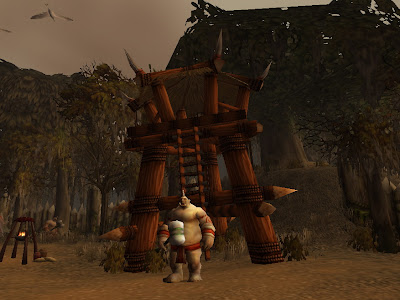
The leader of Brackenwall Village is Overlord Mok’morokk, a giant even by ogre standards. When I saw him, he stood next to the central bonfire, gnawing on a crocolisk tail. He never moved from his position the entire day I stayed in Brackenwall. One of the other orcs in Brackenwall told me that an overlord’s only real duty is to intimidate his subjects. Late in the day, Mok’morokk slammed his giant fist into another ogre who was walking past him. He continued his attack until the lesser ogre went limp. Fights between ogres are quite brutal, but rarely end in anyone being seriously hurt. Ogres are blessed with a remarkable physical recovery rate.
Brackenwall has no agriculture to speak of, so the ogres get their food by hunting, fishing, and foraging. The ogres tend to deplete resources at an alarming speed, able to render vast tracts of land uninhabitable after a single generation. This trait has earned them the ire of the tauren and night elves. I did see that a few ogres had been taught basic crafts by the orcs, such as metalworking.
There is a small cave in the eastern end of the village. A burning, sulfurous smell emanates from the opening. I cautiously stepped inside. Dying torches cast a weak light in the fetid interior. Hooks dangled from the ceiling on chains and ropes; skewered on each was a ragged chunk of maggot-ridden meat. At the shadowy recess in the back of the cavern stood a two-headed ogre-mage.
“Am I intruding?” I asked.
The ogre-magi are the exception to the rule of ogre stupidity. The orcish warlock, Gul’dan, awakened their intelligence through some arcane ritual. During the Second War, many normal ogres also had two heads. Since then, only the magi have had that characteristic.
“You came in without invitation, so technically yes, you are. I am in a welcoming mood, however,” he rumbled. “We are Draz’zilb. I am Draz.” He spoke only with his right head; its cyclopean fellow muttered something I could not make out.
“My name is Destron Allicant. May I ask you a few questions about the ogres? The others in this village are not particularly gregarious.”
“They are simpering morons. That is how I lead them. Strength is all that matters in the ogre race. For most of our history, it was strength of fist and arm. A few of us, like ourself, more properly myself, can exercise power through word. Though our fists are still quite strong.”
“Mok’morokk is then only a nominal leader?”
“He is the strongest, so the other ogres follow him. His imbecility outweighs his strength though. He no longer listens to me, and he leads the Stonemaul to ruin.”
“You seem very candid about this,” I remarked.
“There is no way you could explain this to Mok’morokk in any way that he would understand. His command of Orcish is so poor as to be nonexistent.”
Draz’zilb began to question me about the Forsaken, and I answered as best I could. He said that the information he got about the outside world was limited. All the while, the left head continued to quietly babble.
“Does each of your heads have a separate personality?” I asked.
“Effectively. Once, all ogres had but one mind each. One very poor mind. Still, we were savagery incarnate. Orcs and draenei alike feared us. At times, they even sallied forth together across the crimson swards to do battle against us. We came through the Portal as did the orcs, though you must know this already.”
“My understanding is that the two-headed ogre is the work of Gul’dan.”
“You would be correct. He saw in us a powerful force for the Horde. But he feared our penchant for chaos. Only superior strength could compel the loyalty of an ogre, and no orc could ever hope to surpass us in that regard. Using his magic, he cursed most of our race with two heads. Every individual ogre would be too busy fighting for control of their own body to rebel against their masters.”
“Wouldn’t this also reduce their effectiveness in combat?”
“Ah, but it did not. For both minds would unite with terrible purpose when obvious danger came around. Our kind was already oblivious to more subtle threats, like Gul’dan’s machinations.”
“And what of the ogre-magi?”
“Gul’dan’s hubris was also responsible for that. Cho’gall was the first of our kind, created by Gul’dan. With two brilliant minds in one body, he was indeed like a god. The minds could provide separate perspectives yet still coalesce their intellects to solve problems. Cho’gall of course, had the discipline necessary to maintain control. But only at first.”
“What happened?”
“I was there when Gall, the left head, began to go mad. His senses went wild, seeing visions and hearing sounds that no one else was aware of, not even Cho. Cho could sense what was afflicting his companion, and he made the mistake of trying to rationally analyze Gall’s insanity. He became a lunatic soon after, though still occasionally capable of sensible action.”
“Did this happen to other ogre-magi?”
“Over time yes. After the Second War, the normal two-headed ogres became easy prey for humans, dwarves, or their single-minded brethren. Some literally destroyed themselves trying to control their own bodies. The only two-headed ogres that survived were the magi.”
“These were the ones that avoided going mad?”
“We are all mad. Gul’dan’s tampering was unstable to say the least. Our minds, while powerful, are very fragile. As you might have guessed, my companion Zilb is defective. I noticed his madness early on, and took steps to rectify it. I dulled his intellect with powerful potions; you cannot know, Destron, what it was like trying to conceal something from him. It was like lying to myself and being aware of it. His delusions were the only reason he did not notice, and I believe he was beginning to suspect. Once I was able to exert some control over his mind, I had him constantly whisper the words to the Prayer of Unity. Zilb meditates on it with what remains of his mind. He is no longer aware enough to know what the prayer truly means, and it keeps his madness at a distance. Zilb would have hated saying a human prayer over and over again, and I take some pleasure in that.”
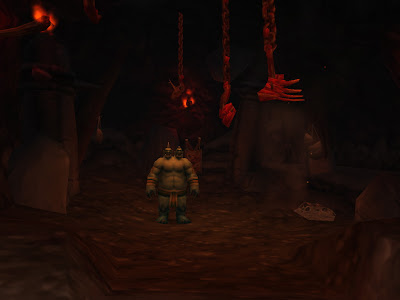
The Prayer of Unity is one of the key prayers in the Church of the Holy Light.
“Then you do not like him?” I asked.
“I never asked to share a body with him, or perhaps he never asked to share a body with me. Neither of us truly remembers any longer. I have proven myself stronger than him.”
“Then for the ogres, power is the only goal?”
“Most content themselves with eating. A few seem to have been weakened by orcish sentiment, and form attachments to others. These rare cases though. We are brutes, and relish the fact.”
“Are any new ogre-magi born into this world?”
“On occasion. Always two-headed. Ironic that our greatest weapon is also our greatest weakness.”
Draz’s face contorted, and he suddenly screamed. Zilb stopped his continuous prayer and began to babble mindlessly. Draz cursed and shouted, tears flowing from his eyes and his body thrashing, as I stepped back to avoid getting hit. Draz made a series of barking shouts, and Zilb fell silent. Zilb returned to his prayer, while Draz took deep, shuddering breaths.
“You should leave now Destron. We might be liable to forget ourselves, and I do not wish to anger the Horde.”
I nodded and did as he asked. As I left the infernal cavern, I heard Zilb whisper the words to a prayer that was meaningless to him.
Hey, Destron, I've heard that there is a new goblin town in Dustwallow Marsh. I haven't checked myself, but I think that it might be worth looking into. (Your article might need an update.) No pressure though. I know that you've got more than you can handle, what with Outland and Wrath of the Lich King coming out on Thursday (Can't wait!!).
ReplyDeleteMudsprocket (the name of the goblin town in question) wasn't yet built when Destron went through Dustwallow Marsh. I'm not currently planning on making a second Dustwallow article dealing with Mudsprocket.
ReplyDeleteI may do such a thing in the future of Blizzard adds more towns and features to some of the relatively overlooked zones in WoW, like Azshara. Enough of those would warrant a revisit to these zones, which I'd probably lump together in a single article.
Thanks for telling me though.
A bit of a less idealistic look on Theramore... and something rather interesting and scary/sad on the Ogres of all things...
ReplyDeleteAs usual, this is really good.